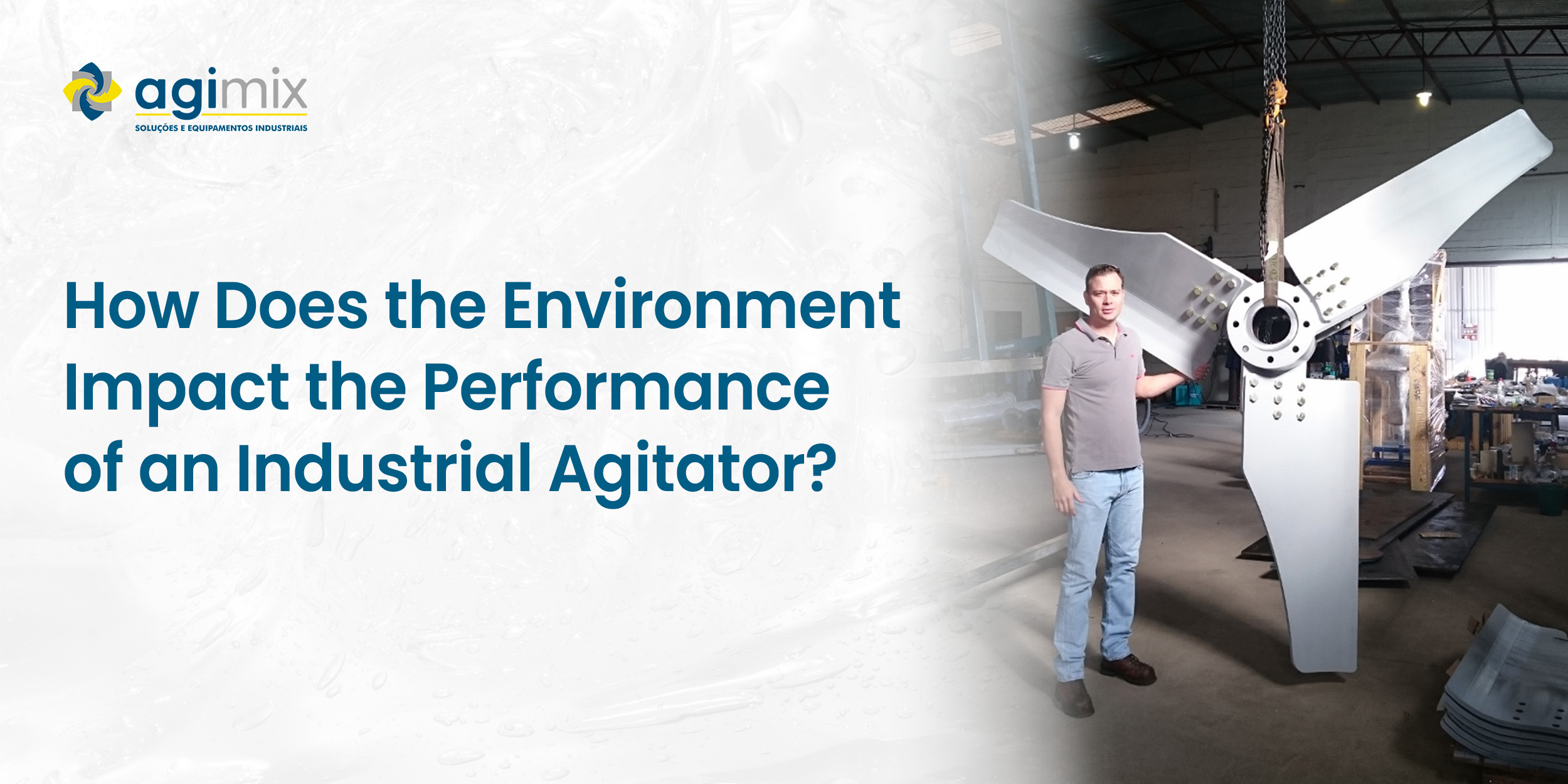
How Does the Environment Impact the Performance of an Industrial Agitator?
Before choosing a mixer or agitator, understand the impact of the environment on your operation. See how Agimix develops robust solutions that perform where other equipments fails.
Why the Environment Has Such a Strong Influence on Mixer Performance
In the industrial mixing world, choosing the right mixer goes far beyond defining capacity, power, or impeller type. One of the most underestimated aspects of mixer design is the environment in which it will operate. Environmental conditions have a direct impact on equipment lifespan, safety, energy efficiency, and, most importantly, final product quality.
When engineers evaluate applications involving high or low temperatures, the conversation quickly shifts to construction materials, sealing types, and chemical resistance. These insights come not only from laboratory analysis but also from years of experience in real industries across Brazil, Latin America, and other global markets where Agimix provides solutions. These environments involve extreme heat, corrosive products, intense abrasion, and low temperatures found in mountainous regions or refrigerated processes.
From the severe heat of refineries to the chemical aggressiveness of sanitation plants and chemical industries, we have seen what works, what fails, and which decisions make a long-term difference.
Below, we present an overview of how environmental factors influence mixer performance and which practices help engineers select the ideal equipment for each type of operation.

Best Practices for Selecting Mixers in Challenging Environments
The choice of sealing system always depends on temperature, pressure, and fluid aggressiveness. At high temperatures, mechanical seals and metallic bellows seals are predominant. At low temperatures and in simpler services, packings and lip seals perform well. Sectors such as oil and gas, sanitation, mining, chemical, pulp and paper, and pharmaceutical industries demand the highest levels of technology and robustness.
Below is a summary of the main industrial scenarios and the most commonly used types of seals.
Oil & Gas and Petrochemical – High temperature and high pressure
Conditions: High pressures, hydrocarbons, corrosive gases, and temperatures that can exceed 300 °C.
Recommended seals:
- Mechanical seals with silicon carbide or tungsten carbide faces
- Metal bellows seals for thermal stability
- Gas-lubricated seals for applications requiring minimal product loss
Chemical Industry – Wide thermal range
Conditions: Highly corrosive acids, bases, and solvents. Temperatures range from cryogenic services to approximately 260 °C.
Recommended seals:
- Packings or lip seals in low-pressure services
- Mechanical seals with special alloys and components in PTFE or graphite
Mining and Mineral Processing – Abrasive slurries, often hot
Conditions: Abrasive slurries of phosphate, copper, gold, or mining tailings. Elevated temperatures due to grinding or leaching processes.
Recommended seals:
- Packings with Kevlar or graphite fibers
- Cartridge mechanical seals with hardened faces and flush plans to prevent abrasive entry
Pulp and Paper – Caustic environment and high temperature
Conditions: Caustic liquor, alkaline solutions, and bleaching agents. Temperatures up to 180 °C.
Recommended seals:
- Mechanical seals resistant to caustic corrosion
- Reinforced packings when small leakage is acceptable
Water and Wastewater – Low temperature and high presence of solids
Conditions: Solids in suspension, sand, sludge, biomass, and water at ambient temperature.
Recommended seals:
- Lip seals or simple packings
- Split mechanical seals in retrofit applications to facilitate maintenance
Pharmaceutical and Biotechnological – Sanitary control and thermal stability
Conditions: Sterile environments, CIP and SIP processes, temperatures between 0 and 150 °C.
Recommended seals:
- Double mechanical seals with barrier fluid
Why it is critical: Prevents contamination and ensures tightness during sterilization thermal cycles
Material Selection According to Temperature and Aggressiveness
Just like with sealing systems, material selection strongly depends on the operating environment.
- At high temperatures, exotic alloys such as Inconel, Hastelloy, or titanium are commonly used.
- At low temperatures or in corrosive services, 316L stainless steel, PTFE, FRP, and special coatings are applied.
Corrosive environments quickly deteriorate equipment without proper protection. For this reason, the design must consider the chemical profile of the fluid, the local atmosphere, and the operating temperature.
Agimix develops its equipment based on real needs of the Brazilian and international industries. The solutions are engineered to withstand heat, cold, abrasion, and aggressive agents that are part of everyday industrial operations.

How Agimix Customizes Mixers to Withstand Critical Environments
At Agimix, environmental factors are evaluated from the very first technical interaction. We analyze each application individually, considering operating conditions, chemical risks, and installation challenges.
Among the most common customizations are:
- Correct material selection according to chemical exposure
- Sealing systems sized for temperature, pressure, and corrosiveness
- Reinforced shafts and impellers for abrasive operations
- Additional protections and coatings for severe environments
- Adaptations for field operation, remote locations, or weather-exposed installations
Request your quote with Agimix and let our team of specialists take care of everything!
Conclusion – Mixers Designed for the Real World
The most efficient mixers are not just strong or powerful—they are engineered for the environment in which they will operate. That is why Agimix designs every piece of equipment with total focus on resilience.
Our mixers are configured considering:
- Motors and gearboxes adapted to climate, altitude, duty cycle, and torque
- Materials that resist corrosion, abrasion, and stress cracking
- Coatings that prevent degradation from abrasive slurries or aggressive chemicals
- Lubrication and bearings sized for extreme heat or intense cold
- Sealing systems compatible with the chemical composition and temperature—never generic
The result is a mixer prepared to operate reliably in the long term, whether in Brazilian refineries, mining industries in South America, chemical plants, sanitation facilities, or high-severity industrial processes.
Agimix delivers not just mixers, but robust solutions that work where other equipment fails.
If you want to explore mixer options or request a customized quote, contact our technical team and we will quickly return with the ideal solution for your application.
